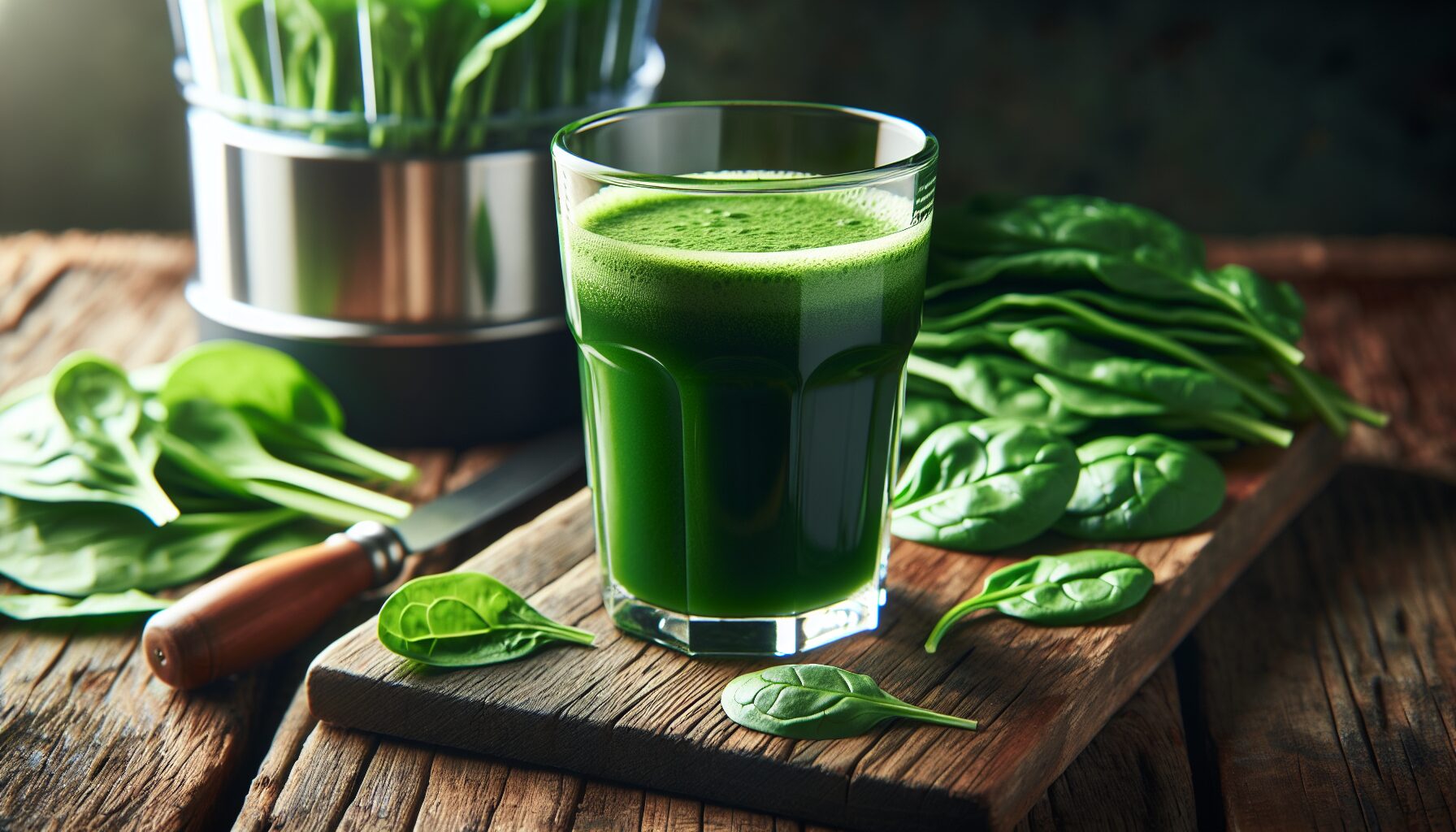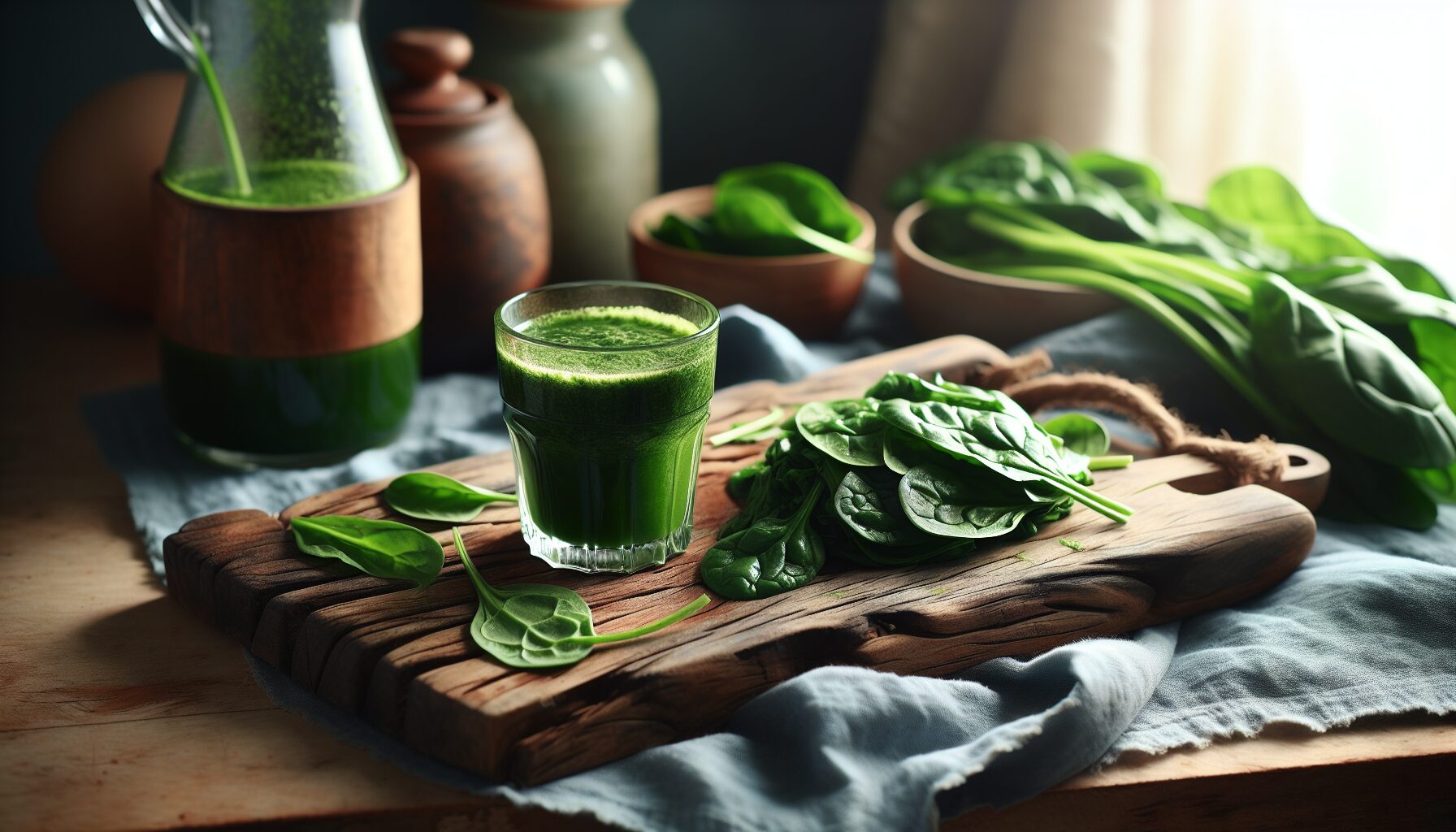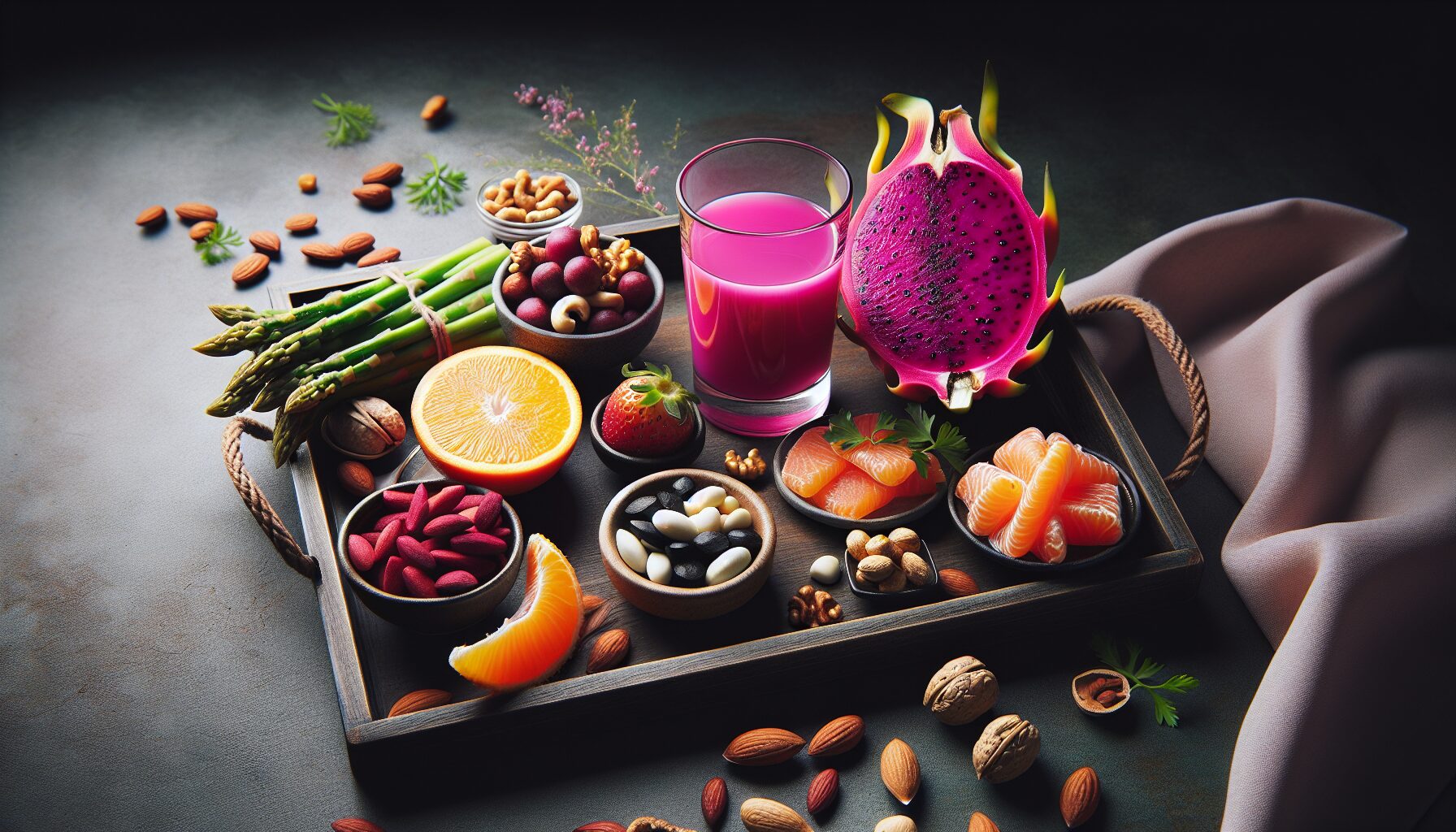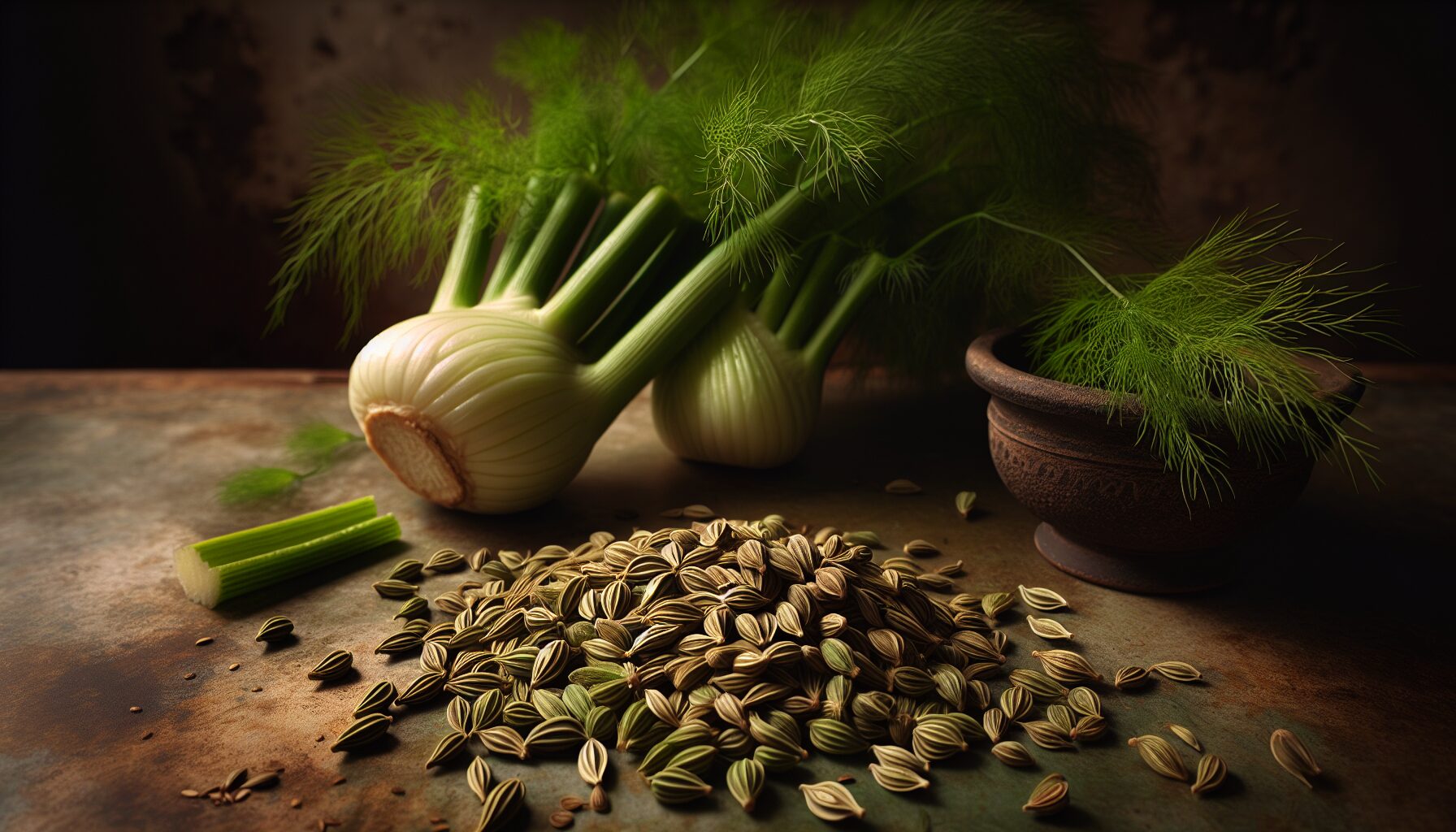
Spinach Juice Benefits
Spinach is a leafy green vegetable with many potential health benefits and can easily be turned into a juice or smoothie. A spinach juice is made from raw spinach leaves. Often raw foods contain a lot more nutrients than cooked foods, because of heat degradation of nutrients.
Spinach is rich in various minerals, vitamins and antioxidants that we need for optimal health. Spinach juice contains high amounts of manganese, potassium, biotin, iron and vitamin C, which all contribute to ensuring that the body stays in good health. Because of its high concentration of nutrients, spinach is considered to be a superfood.
Maintaining good nutrition is really important, especially if you are exercising regularly or in an intensive job. The body needs to replenish, or revitalize, itself with vital nutrients constantly to maintain a healthy and disease free state.
In this article we will cover how spinach juice could help your body to maintain more optimal health, providing potential benefits to various aspects of your life.

Nutrients In Spinach Juice
Spinach juice is rich in many essential nutrients. The good thing about spinach juice is that it has been condensed down through the mechanical juicing process. Eating the same portion of cooked spinach would require the body to go through the mechanical digestion process itself. With juicing this process has already been completed.
This means that it is more nutrient dense per portion, or offers more access for the body to absorb its vital nutrients. Some of the key nutrients available in spinach and spinach juice include alpha lipoic acid, vitamin C and iron.
Manganese
Spinach contains around 0.49mg of manganese per 100 grams. Your RDA for manganese is between 2mg and 2.6mg a day, so spinach covers a significant amount of this RDA. The manganese content of spinach is quite high relative to many other foods. This is most likely because of the amount of photosynthesis that spinach does.
Manganese plays a really important role in the body, supporting many metabolic processes. It does this through its involvement in enzyme activity, being a key regulating factor for the production of many enzymes throughout the body. Because of this, manganese also has a key role in the regulation of growth. Manganese status affects things like bone formation, neurotransmitter synthesis, hormone production and can also affect blood glucose levels.
The powerful antioxidant enzyme, superoxide dismutase, contains manganese and is preventative of oxidative damage from free radicals. This can lead to cancers and manganese status is therefore linked to cancer risk.
Because of these health benefits and actions within the body, manganese could also improve athletic performance. This is therefore a potential health benefit of eating spinach in the right amounts.
Potassium
100 grams of raw spinach juice contains 582mg of potassium. Our RDA for potassium is between 2,500 and 3,500mg a day. Spinach juice is therefore a good source of this essential electrolyte.
Potassium is required across the body. Healthy levels of potassium are important and support healthy muscular movements and nerve transmissions. Elevated potassium levels are also linked with much reduced risks of strokes and is thought to lower blood pressure. Spinach juice therefore has potential health benefits in supporting optimal muscle and nervous system functioning.
Magnesium
Spinach also contains very significant levels of magnesium. Our RDA is recommended to be around 300mg or 400mg a day. Considering that spinach contains around 90mg of magnesium per 100 grams, spinach juice provides a significant amount of magnesium and offers potential health benefits from magnesium sufficiency.
Magnesium is an essential electrolyte and found in a balance with other electrolytes within the body. Magnesium is very important for optimal muscle relaxation and movement, regulating the production of nerve transmitters such as serotonin. This essential mineral supports healthy energy, protein and DNA production in the body.
Iron
Spinach is a good source of iron, providing 1.26mg of iron per 100 grams of spinach juice. Our RDA is between 11 and 15mg for most people, which means spinach juice could contribute nicely to our RDA. There are high levels of iron in spinach, because of its photosynthetic activity.
Iron is vital for red blood cell formation, improving oxygen status throughout the body. Iron therefore supports healthy blood flow, providing the brain and muscles with vital nutrients. Vitamin C, which is also high in spinach, assists with improved iron intake. Spinach juice could have additional benefits for brain and muscle activity through improved iron levels.

Biotin
In 100 grams of spinach there is 1.66µg of biotin. You may have heard of biotin, or vitamin B7, because of how it is linked in many studies to optimal hair and nail health. While there is not an RDA, some studies recommended that you consume at least 30µg of biotin a day.
Biotin is an energy supporting B vitamin, fundamental to assisting with the tasks we do throughout our lives. Basically, this vitamin helps with fatty acid and glucose production for energy, while assisting branched chain amino acid production. This ensures that the body has the essential building blocks needed for supporting growth. BCAAs in particular are important for healthy growth and can trigger or regulate protein production.
If you are an athlete this nutrient is also vital, as it supports healthy muscle metabolism, growth and recovery. Biotin is also important for optimal brain health and ensures that the brain has enough energy for our daily tasks.
Vitamin C
Spinach is quite rich in antioxidants. This includes one of the most important antioxidant vitamins, known as vitamin C. Your RDA for vitamin C is between 75mg and 90mg.
Per 100 grams of spinach, there is around 27mg of vitamin C which is about one third of your RDA. Antioxidants neutralize free radicals which are looking to disrupt the DNA or other molecules within cells. The high energy dissipation from free radicals can cause cancers through DNA changes.
Vitamin C is really important for optimal immune system functioning, wound healing and connective tissue production. Elevated vitamin C promotes collagen production, which is an important part of muscle and collagen is also thought to promote more youthful looks.
Vitamin A
The vitamin A content in spinach is high, containing around 283µg of vitamin A and 3400µg of beta carotene. Beta carotene can be converted into vitamin A. Research suggests that spinach can significantly contribute to our vitamin A requirements. Our RDA for vitamin A is between 700µg and 900µg, including vitamin A activity equivalents per day.
Beta carotene is a strong antioxidant, protecting from DNA damage, while retinol, or pure vitamin A, is also an antioxidant. Vitamin A supports optimal eye health and is required for our colour and low light vision. Sufficiency in vitamin A also supports optimal fertility in men and women.
Lutein
There is thought to be around 6,500µg of lutein per 100 grams of cooked spinach.
Lutein is an antioxidant compound that has been identified to be essential for optimal eye health but can’t form vitamin A. It is a carotenoid pigment found in the eyes which protects the macula from blue light damage. Oxidative damage to the macula is a leading cause of blindness which can manifest with age.
The general US population eats around 1mg or 3mg of lutein per day, with 3mg of lutein per day considered to be protective against the risks of developing certain eye diseases.Spinach juice contains a very high lutein content and can provide benefits against the risks of degenerative eye diseases.
Alpha Lipoic Acid
Alpha lipoic acid, sometimes called ALA, is a strong antioxidant. It is able to absorb the damaging energy from cancer causing free radical molecules.
Spinach juice contains a naturally occurring and bioactive form of alpha lipoic acid called lipoyllysine. Spinach has been assessed to 3.15µg of alpha lipoic acid per gram of dried spinach leaves. Relative to other alpha lipoic acid rich foods, this food is one of the highest in alpha lipoic acid.
Some health benefits of alpha lipoic acid, found in rich amounts in spinach juice include healthy growth promotion, immune system stimulation and reductions in oxidative cell stress. Alpha lipoic acid is also able to replenish other antioxidants in the body.
It therefore supports whole body system destressing. In fact, alpha lipoic acid may encourage higher overall antioxidant levels in the liver, such as glutathione, which supports healthy body detoxification. Alpha lipoic acid also supports elevated levels of vitamin C and E. A
LA or alpha lipoic acid could also help to support the stability of fatty acids in the brain, supporting more optimal brain health.
Through spinach juice consumption, you could potentially gain some of these potential health benefits too.

Spinach As A Prebiotic
As a plant food, spinach has another health benefit in that it can provide a small amount of dietary fibre. Spinach is thought to contain high amounts of prebiotic dietary fibre compared to other foods. There is around 1.6 grams of dietary fibre within 100 grams of spinach.
Dietary fibres are long chain sugars that our body can’t really digest that well. This is why they are a prebiotic, as they can offer food for our gut bacteria. Gut bacteria really like these beta-glucose sugars, often found in leafy greens, promoting different microbial complexes in the digestive tract. Prebiotic dietary fibres encourage beneficial gut bacteria to develop, supporting optimal gut health.
Beneficial gut bacteria can improve immune responses, lowering inflammation in the gut and supporting brain health. Unhealthy gut microbes may drive intestinal inflammatory responses through activating the immune system. Consuming spinach juice may therefore support our health through its benefits on promoting healthy gut bacteria.
Clinical Studies With Spinach And Spinach Juice
Clinical studies with spinach juice support the suggested health benefits of regular spinach juice consumption. For example, red spinach juice was shown to be comparable to iron supplements in supporting haemoglobin levels in women with anaemia.
Supplements with spinach extract also improved athletic performance, measures of power and speed, while also lowering overall blood pressure. This is consistent with the nutritional profile of spinach and supports its potential health benefits. These effects were also observed in a study with elderly participants who had improved muscle strength from regularly consuming spinach extract.
Another study outlined the spinach juice could have anti-inflammatory effects within the body, specifically within blood vessels. This may be as a result of its antioxidant content. This again is solid researched support for the potential benefits of spinach juice. Other studies support this, showing that spinach supports anti-inflammatory responses within the body from intensive anaerobic exercise. Levels of the antioxidant enzyme, superoxide dismutase, were also higher after eating spinach.
Studies with spinach also suggest that they promote improved gut biodiversity and reduce risks of obesity.

Summary
Spinach juice benefits various aspects of our health. As a raw vegetable, spinach juice is more nutrient dense than it when it is cooked. Spinach is a nutrient dense plant food full of minerals such as potassium, iron, magnesium and manganese, while it also contains a lot of health supporting antioxidants. Due to a high concentration of nutrients, spinach is considered to be a superfood.
The manganese content of spinach juice supports the regulation of growth, bone formation and hormone synthesis. It also supports antioxidant activities within the body through superoxide dismutase. Spinach could therefore support healthy and more optimal athletic performance. Spinach juice also provides electrolyte support, through elevated levels of potassium and magnesium, for healthy muscle activity.
The iron content in spinach is high because of its photosynthetic capacity, which supports healthy cognitive and muscle performance via improved oxygen status. The healthy levels of biotin in spinach support healthy growth in the body, promoting improved hair and nail health.
Spinach juice also contains high levels of the antioxidant vitamin C which supports collagen production. Vitamin C also helps to support the immune system. Spinach juice could have real potential benefits, such as protecting eye health or supporting detoxification, through its antioxidants such as vitamin A, lutein and alpha lipoic acid. Consuming spinach juice may also support our health through promoting healthy gut bacteria.
The health benefits from consuming spinach juice are really clear, influencingbeneficial gut bacteria, higher antioxidant levels and red blood cell formation within the body.
For more interesting articles, see the main articles page below.





